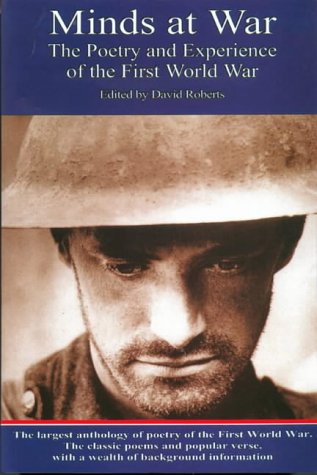
MINDS AT WAR By David Roberts
#(The Poetry and Experience of the First World War)
This book lays bare the obscenities of war and the propaganda tricks employed to encourage people to sacrifice themselves willingly in the cause of "defence of the country". Mr. Gove, the flag-waving Education Secretary, should read it. He might then think twice about glorifying war. Here are some verses which mirror the feelings before the actual experience and the very different ones after tasting the reality. "Keep the home fires burning/Though your hearts are yearning/There's a silver lining/Through the dark clouds shining/We'll turn those dark clouds inside out/When the boys come home." Millions of "boys" never came home. Their bodies lay rotting on the battlefields.
"If I should die, think only this of me,/That there's some corner of a foreign field/That is forever England." Rupert Brooke. :
"I knew a simple soldier boy/Who grinned at life in empty joy/Slept soundly through the lonesome dark/And whistled early with the lark./In winter trenches , cowed and glum,/Through rats and crumps and lack of rum,/He put a bullet through his brain./No-one ever spoke of him again./You smug-faced crowds with kindling eye,/Who cheer as soldier lads go by/Creep home and pray you'll never know /The hell were youth and laughter go. Siegfried Sassoon.
The author goes through the whole story. There's the international situation at the time, the influence of the various monarchs and the role of political leaders, the gradual change from Germany as the friend, to Germany as as the enemy, the propaganda carried out by famous writers and poets persuading the people to think "patriotically" of which the following is an excellent example, with important echoes for the present day. "We should not..(turn to) the press for anything but the most distorted reflection of the mind of the country. ... suggesting the false and suppressing the true is carried to perfection by the newspapers .... The papers pretend to interpret the spirit of the people (but) set forth the beliefs, desires and prejudices of ...the governing classes." The New Age (weekly). The author shows how, as the result of actual experience of war, both at home and in the trenches, feelings began to change, from blind patriotism to fierce hatred of the slaughter and misery it brought millions. Early supporters of the war (e.g. Sasson and Owen) wrote fierce denunciations of it later. Strikes broke out, and there were desertions at the front. This happened in Germany, too, where a militant pacifist movement mirrored the somewhat smaller one in England. In Germany and Russia, it led to revolutions
There were many attempts to stop the war in the first place and, recently, a senior historian said that the war was entirely unnecessary. An international women's peace organisation held a meeting in Geneva, just before war broke out and issued a statement which tried to persuade all, especially women, to oppose war. A senior historian has recently declared that the war was unnecessary. At an early stage, the Kaiser put forward reasonable (it seems to me) peace proposals rejected by the Allies. And, of course, there was the famous football match, on the first Christmas, between teams who had just been trying to kill each other from opposite trenches.
The foregoing is only a glimpse of the wealth of information contained in the book. I finish with an apt quote from the poet, Arthur West."... how could (the upper classes) give so much time and labour to the killing of others, though to the plain appeals of poverty ... they are so absolutely heedless.
If you read this book and don't finish up hating war and determined to prevent another one, then your heart must be made of stone.
Reviewed by Len Goldman,Feb.2014.
